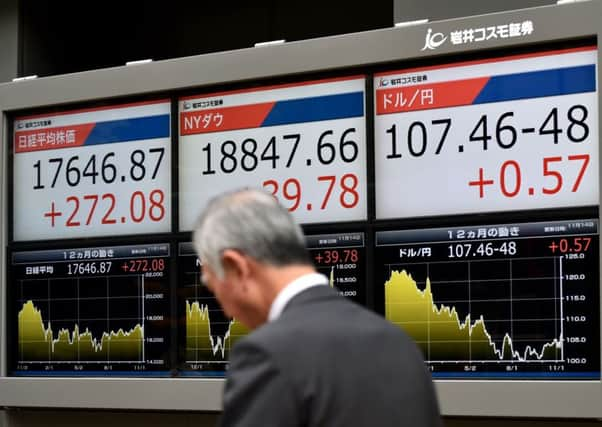Bill Jamieson: What now for markets as Trump takes charge?
This article contains affiliate links. We may earn a small commission on items purchased through this article, but that does not affect our editorial judgement.


That was the initial reaction in markets as the US election results leaned towards a victory for the champion of the Deplorables. But that conventional wisdom barely lasted two hours as an emollient victory speech saw stock markets round the world somersault. The high-spending, tax-slashing Trump would be great for shares!
But ahead of the result, many of the great and good had made up their minds. A Trump victory, they warned, would trigger a world-wide sell-off in markets. As I mentioned here last week, the prestigious Brookings Institution forecast a fall of between 10 and 15 per cent on Wall Street in the event of a Trump victory. How spectacularly wrong this proved.
Advertisement
Hide AdAdvertisement
Hide AdAs with the initial reaction to the UK referendum vote to leave the EU, had investors slept through the initial alarm, snored through the sirens of the Brookings Institution and waited for markets to settle, useful gains would have been made and big losses avoided.
Rip van Winkle is by no means an infallible model for successful investment. But more often than not, dozing through the instant punditry and the short-lived cross currents in markets can prove the winning strategy.
Similar certitude of the wrong result marked the UK referendum outcome. Now we have a repeat – only of a far greater order of magnitude. It would be reassuring to think that investment fund managers and analysts stood aloof from these profound errors and concentrated on fundamentals.
Alas, the “above it all” manager is a rare beast. Late on Friday morning I received a breathless email from a leading wealth management firm purporting to offer considered commentary on the US election result. At least the author had the humility to admit that his firm had called both the UK referendum vote and the US Presidential election result wrong.
That said, we have entered a difficult and unnerving period for investors, for no one knows as yet which of Donald Trump’s many outlandish, improbable and contradictory campaign commitments will survive into the legislative programme.
In this respect I believe the consensus is right: that we have seen a turning point in bond and fixed interest markets and we are likely to see rising bond yields – and, as the alter ego, falling bond prices as investors price in a greater likelihood of higher inflation. This would bring to an end a 30 year bull run for bonds.
Here we run into a major improbable of the promised Trump programme: how far his plans for radical business and household tax cuts, together with that mooted federal government spending spree, can proceed without a further rise in federal government debt, already at $19 trillion (£15.3 trillion), three times the 2000 level.
I believe much of his tax cutting and ultra-Keynesian government works spending ambitions will be modified in their passage through Congress. While there is a Republican majority, that does not secure an easy ride for Trump’s fiscal programme, given that many Republicans have been staunchly opposed to ever-increasing reliance on government debt. They will note the warning from veteran US investor Jim Rogers that Trump’s victory is a “disaster”. He is particularly concerned about proposals for trade tariffs which could trigger retaliation.
Advertisement
Hide AdAdvertisement
Hide AdRogers said: “What he does, if he does what he says, is going to be a disaster and we are all going to go bankrupt. Trade wars throughout history are serious problems.”
Set against that scary assessment is the view of former Times columnist Anatole Kaletsky, now chief economist of Hong-Kong-based Gavekal Dragonomics. He predicts roaring US economic growth. In the first two years of Trump’s term, Kaletsky sees the US economy growing faster than the average rate during Obama’s eight years. Already Trump’s pledge to rebuild America has boosted the commodities sector, where metals such as copper and nickel surged in anticipation of a US infrastructure boom.
My own view is that a brake on the range of Trump’s election pledges looks likely. However, some of this stimulus – tax reduction and spending uplift – will win through, and to the benefit of many US companies involved in infrastructure, construction, building materials and civil engineering, while the financial sector stands to gain from a lighter regulatory regime. For these reasons, exposure to US equities should be maintained and preferably increased.
